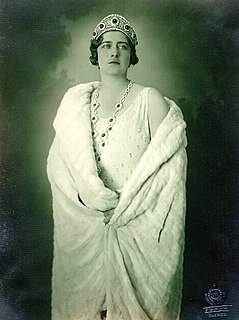Related Research Articles

The Karađorđevićdynasty is a Serb family, founded by Karađorđe Petrović (1768-1817), the veliki vožd of Serbia during the First Serbian Uprising of 1804-1813. In the course of the 19th century the relatively short-lived dynasty was supported by the Russian Empire and was opposed to the Austria-Hungary-supported Obrenović dynasty. After Karađorđe's assassination in 1817, Miloš Obrenović founded the House of Obrenović. The two houses subsequently vied for the throne for several generations. Following the assassination of the Obrenović King Alexander I of Serbia in 1903, the Serbian Parliament chose Karađorđe's grandson, Peter I Karađorđević, then living in exile, to occupy the throne of the Kingdom of Serbia. He was duly crowned as King Peter I, and shortly before the end of World War I in 1918, representatives of the three peoples proclaimed a Kingdom of the Serbs, Croats and Slovenes with Peter I as sovereign. In 1929 the kingdom was renamed Yugoslavia, under Alexander I, the son of Peter I. In November 1945 the family lost their throne when the League of Communists of Yugoslavia seized power during the reign of Peter II.

Maria of Romania or Marie of Yugoslavia, known in Serbo-Croatian as Marija Karađorđević, was Queen of the Serbs, Croats and Slovenes, later Queen of Yugoslavia, as the wife of King Alexander from 1922 until his assassination in 1934. She was the mother of Peter II, the last Yugoslav monarch. Her citizenship was revoked and her property confiscated by the Yugoslav Communist regime in 1947, but she was "rehabilitated" in 2014.

Alexander, Crown Prince of Yugoslavia, also claiming the crowned royal title of Alexander II Karađorđević, is the heir to the defunct throne of the Kingdom of Yugoslavia and currently claimant to the abolished throne of the precursor Kingdom of Serbia. He is the head of the House of Karađorđević. Alexander is the only child of former King Peter II and his wife, Princess Alexandra of Greece and Denmark. He held the position of crown prince in the Democratic Federal Yugoslavia for the first four-and-a-half months of his life, from his birth until the declaration of the Federal People's Republic of Yugoslavia later in 1945.
The Serbian Liberal Party was a conservative liberal, nationalist and monarchist political party in Serbia.
Goran Bunjevčević was a Serbian footballer who played as a defender in Serbia, England and the Netherlands.

Krsto Popović was an officer of the Montenegrin Army who fought in the Balkan Wars and in the First World War.

Prince Philip of Yugoslavia, also known as Philip Karađorđević, is a member of the House of Karađorđević.

Dragoslav Šekularac was a Serbian professional footballer and coach. Nicknamed Šeki, he was quick and crafty with the ball, displaying creative skills which turned many heads. Possessing supreme self-confidence along with impeccable technical ability, he was one of the biggest showmen and crowd draws in the history of Yugoslav football. His enormous popularity throughout FPR Yugoslavia during the early 1960s transcended sports as he easily became one of the most recognizable individuals in the country. As a coach, he led several clubs in Canada, Colombia, Australia, Serbia, Mexico, and Spain, as well as the Guatemala national team in the 1986 FIFA World Cup qualification.
The Order of Karađorđe's Star is Serbia's highest civilian and military decoration. It originated in the Kingdom of Serbia, and was initially awarded exclusively to Serbian citizens in return for services rendered to the Serbian monarchy, the Serb people and the Serbian state, though it is now bestowed upon Serbs and non-Serbs alike. During the Balkan Wars and World War I, the Order was mostly awarded for acts of bravery on the battlefield. The post-war Kingdom of Yugoslavia retained the Order, and it was awarded by the Yugoslav government-in-exile until the end of World War II, in some cases to individuals who collaborated with the Axis powers. Following the war, the monarchy was outlawed and a communist government came to power. Along with other monarchist symbols, the Order was suppressed during the administration of Josip Broz Tito, and replaced with communist decorations such as the Order of the People's Hero.

Konstantin "Kosta" Milovanović Pećanac was a Serbian and Yugoslav Chetnik commander (vojvoda) during the Balkan Wars, World War I and World War II. Pećanac fought on the Serbian side in both Balkan Wars and World War I, joining the forces of Kosta Vojinović during the Toplica uprising of 1917. Between the wars he was an important leader of Chetnik veteran associations, and was known for his strong hostility to the Yugoslav Communist Party, which made him popular in conservative circles. As president of the Chetnik Association during the 1930s, he transformed it into an aggressively partisan Serb political organisation with over half a million members. During World War II, Pećanac collaborated with both the German military administration and their puppet government in the German-occupied territory of Serbia.
Crime in Serbia is combated by the Serbian Police and other government agencies.

Miloš Cvetković is a Serbian footballer who plays as a right-back for Mladost Lučani.

Nikola Kalabić was a Serbian Chetnik commander during World War II.

Momčilo Gavrić was the youngest known soldier ever who was accepted into his unit at the age of seven, and promoted to the rank of corporal at the age of eight.

The house of Jevrem Grujić is located in 17 Svetogorska Street, – the first designated heritage building since the founding of the Cultural Heritage Protection Institute of the City of Belgrade, in 1961. It is located in the immediate distance from the theatre "Atelje 212". The descendants of Jevrem Grujić, a prominent figure of the Serbian 19th century diplomacy, still live in this house. The life and work of members and descendants of the Grujić family is associated with the important political and social events in Serbia.
Momčilo Janković was a Serbian politician in the Nazi-controlled Government of National Salvation in 1941.

Nebojša Dugalić is Serbian actor, theater director and drama professor.

Vladimir Ljotić was a Serbian politician and diplomat who served as the Serbian government consul to Greece.
References
- ↑ Radule Božović rehabilitated
- ↑ Slobodan Jovanović rehabilitated
- 1 2 The rehabilitated
- ↑ Academic painter Mihailo Milovanović rehabilitated
- ↑ "Mita Gaga podelio Pirot". Večernje novosti. 13 Jan 2016. Retrieved 21 Feb 2016.
- ↑ Reporter for "Politika" Grigorije Božović rehabilitated
- ↑ Đoka Dunđerski rehabilitated after 60 years
- ↑ Cartoonist of "Ošišanog ježa” rehabilitated
- ↑ Dragoslav Marjanović from Ljiga rehabilitated
- ↑ "BRANIO JE 618 UBICA Neverovatna životna priča advokata Veljka Guberine". Blic. 3 Jan 2016. Retrieved 21 Feb 2016.
- ↑ Rehabilitovan knez Pavle Karađorđević Archived 2014-03-08 at the Wayback Machine
- ↑ "Rehabilitovan Milan Antić, ministar dvora Karađorđevića". Blic . Retrieved 2014-05-02.
- ↑ Radosavljević, E. "Rehabilitovan Nedićev ministar Momčilo Janković". Večernje novosti. Retrieved 2014-05-02.
- ↑ Crnjanski Spasojević, V. "Rehabilitovan princ Tomislav". Večernje novosti. Retrieved 2014-05-02.
- ↑ Puzović, B. "Divci: Rehabilitovan ubijeni predsednik". Večernje novosti. Retrieved 2014-05-02.
- ↑ Mirić, S. "Streljani nemci grupno rehabilitovani" . Retrieved 2014-05-02.
- ↑ "Rehabilitovan akademik Radoslav Grujić". Blic . Retrieved 2014-05-02.
- ↑ "Rehabilitovan Andrej Karađorđević". Radio Television of Serbia . Retrieved 2014-05-02.
- ↑ Crnjanski Spasojević, V. "Rehabilitovana kraljica Marija Karađorđević". Večernje novosti. Retrieved 2014-05-02.
- ↑ %5b%5bVecernje novosti%5d%5d "Rehabilitovan Aleksandar Karađorđević" Check
|url=value (help). Retrieved 2014-07-08. - ↑ %5b%5bVecernje novosti%5d%5d "Rehabilitovan kralj Petar Drugi" Check
|url=value (help). Retrieved 2014-08-29.